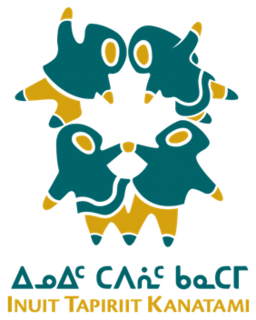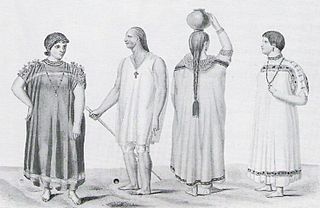Related Research Articles

The Chittagong Hill Tracts, often shortened to simply the Hill Tracts and abbreviated to CHT, are group of districts within the Chittagong Division in southeastern Bangladesh, bordering India and Myanmar (Burma). Covering 13,295 square kilometres (5,133 sq mi), they formed a single district until 1984, when they were divided into three districts: Khagrachari District, Rangamati Hill District, and Bandarban District.

Inuit Tapiriit Kanatami, previously known as the Inuit Tapirisat of Canada, is a nonprofit organization in Canada that represents over 65,000 Inuit across Inuit Nunangat and the rest of Canada. Their mission is to "serve as a national voice protecting and advancing the rights and interests of Inuit in Canada."
The indigenous people of Africa are groups of people native to a specific region; people who lived there before colonists or settlers arrived, defined new borders, and began to occupy the land. This definition applies to all indigenous groups, whether inside or outside of Africa. Although the vast majority of Native Africans can be considered to be "indigenous" in the sense that they originated from that continent and nowhere else, identity as an "indigenous people" is in modern application more restrictive. Not every African ethnic group claims identification under these terms. Groups and communities who do claim this recognition are those who by a variety of historical and environmental circumstances have been placed outside of the dominant state systems. Their traditional practices and land claims often have come into conflict with the objectives and policies promulgated by governments, companies and surrounding dominant societies.
Ida Louise Altman is an American historian of colonial Spain and Latin America. Her book Emigrants and Society received the 1990 Herbert E. Bolton Prize of the Conference on Latin American History. She is Professor Emerita of History at the University of Florida and served as Department Chair.

Rodolfo Stavenhagen was a German-born Mexican sociologist and anthropologist who specialized in the study of human rights and the political relations between indigenous peoples and states. He was a professor-researcher at El Colegio de México. In 2001 he was appointed by the United Nations Commission on Human Rights the first United Nations Special Rapporteur on the situation of the human rights and fundamental freedoms of indigenous people through Resolution 2001/57. His mandate expired 30 April 2008. He was succeeded by Prof S. James Anaya of the University of Arizona.

The International Work Group for Indigenous Affairs (IWGIA) is an independent and non-profit international human rights-based membership organization, whose central charter is to endorse and promote the collective rights of the world's indigenous peoples. Established in 1968, the IWGIA is registered as a non-profit organization in Denmark, with the head office of its secretariat based in Copenhagen. IWGIA's work is primarily funded by the Nordic Ministries of Foreign Affairs and the European Union.
Andrew Gray was a British anthropologist and activist for the rights of indigenous peoples.
The Aweer are a Cushitic ethnic group inhabiting the Coast Province in southeastern Kenya. Some members are also found in southern Somalia. They are indigenous foragers, traditionally subsisting on hunting, gathering, and collecting honey.
Ngenechen is one of the most important Ngen spirits within traditional mapuche religion; and is the most important deity in the present beliefs of the Mapuche people.

Lykke Friis is Prorector for Education at the University of Copenhagen and is a former Danish politician for the party Venstre and former Minister for Climate and Energy and equal rights. Prior to her political career she has once before been Prorector at the University of Copenhagen and held the position from 2006 - 2009. Prior to her appointment as government minister, she was not a member of Venstre.

Amazonia for Sale is a documentary film about the struggle of the Peruvian indigenous peoples Awajún for the preservation of their lands and the survival of their people and culture. The documentary was produced by Ore Media, the International Work Group for Indigenous Affairs (IWGIA) and the Organization for the Development of Border Communities of the Cenepa River (ODECOFROC), a group made up of 56 Awajun and Wampis communities.

The Chiquitano or Chiquitos are an indigenous people of Bolivia, with a small number also living in Brazil. The Chiquitano primarily live in the Chiquitania tropical savanna of Santa Cruz Department, Bolivia, with a small number also living in Beni Department and in Mato Grosso, Brazil. In the 2012 census, self-identified Chiquitanos made up 1.45% of the total Bolivian population or 145,653 people, the largest number of any lowland ethnic group. A relatively small proportion of Bolivian Chiquitanos speak the Chiquitano language. Many reported to the census that they neither speak the language nor learned it as children. The Chiquitano ethnicity emerged among socially and linguistically diverse populations required to speak a common language by the Jesuit Missions of Chiquitos.

Nini Arlette Theilade was a Danish ballet dancer, choreographer and teacher.
Chandra Kalindi Roy-Henriksen is a scholar of indigenous rights and the former chair of the Indigenous Peoples and Development Branch/Secretariat of the Permanent Forum on Indigenous Issues (IPDB/SPFII), an entity that describes its main function as supporting the work of the United Nations Permanent Forum on Indigenous Issues.
The Asia Indigenous Peoples Pact (AIPP) is a regional organization founded in 1992 by indigenous peoples’ movements. AIPP promotes and defend indigenous peoples’ human rights, including land rights and cultural rights.

Láilá Susanne Vars is a Norwegian-Sami lawyer and former politician. Elected rector of Sámi University of Applied Sciences 2019-2023. First Sámi women to achieve a PhD in Law. She is former research director at the Norwegian National Human Rights Institution (NHRI). Expert member of the United Nations' Expert Mechanism on the Rights of Indigenous Peoples.
Rosa Palomino Chahuareses is an Aymara Indigenous leader, journalist, human rights activist, and social leader in Peru. In 2014, the Ministry of Culture presented her with an award for her work in developing community radio for women.
Claire Winfield Ngamihi Charters is a New Zealand Māori academic from the Ngāti Whakaue, Tūwharetoa, Ngāpuhi and Tainui tribes. She specialises in indigenous peoples’ rights in international and constitutional law. She is an associate professor in the Faculty of Law at the University of Auckland and co-director of the Aotearoa New Zealand Centre for Indigenous Peoples and the Law.
Aviâja Egede Lynge is a Greenlandic social anthropologist who actively supports the rights of indigenous Inuit people. In her native Greenland, she has contributed to training teachers to appreciate their cultural identity and their indigenous rights. Since 2015, she has been Greenland's Spokesperson for the Rights of the Child (børnetalsmand), a position she has been invited to maintain until 2025. Since 2020, she has been a member of the General Assembly of the International Indigenous Women’s Forum (FIMI).
References
- ↑ "Biologist with strong indigenous peoples' knowledge appointed as new IWGIA chair - IWGIA - International Work Group for Indigenous Affairs". www.iwgia.org.
- ↑ Tveit, Geir (April 18, 2013). "Staff at Department of Food and Resource Economics (IFRO)". ifro.ku.dk.
- ↑ IPNI. Theilade.